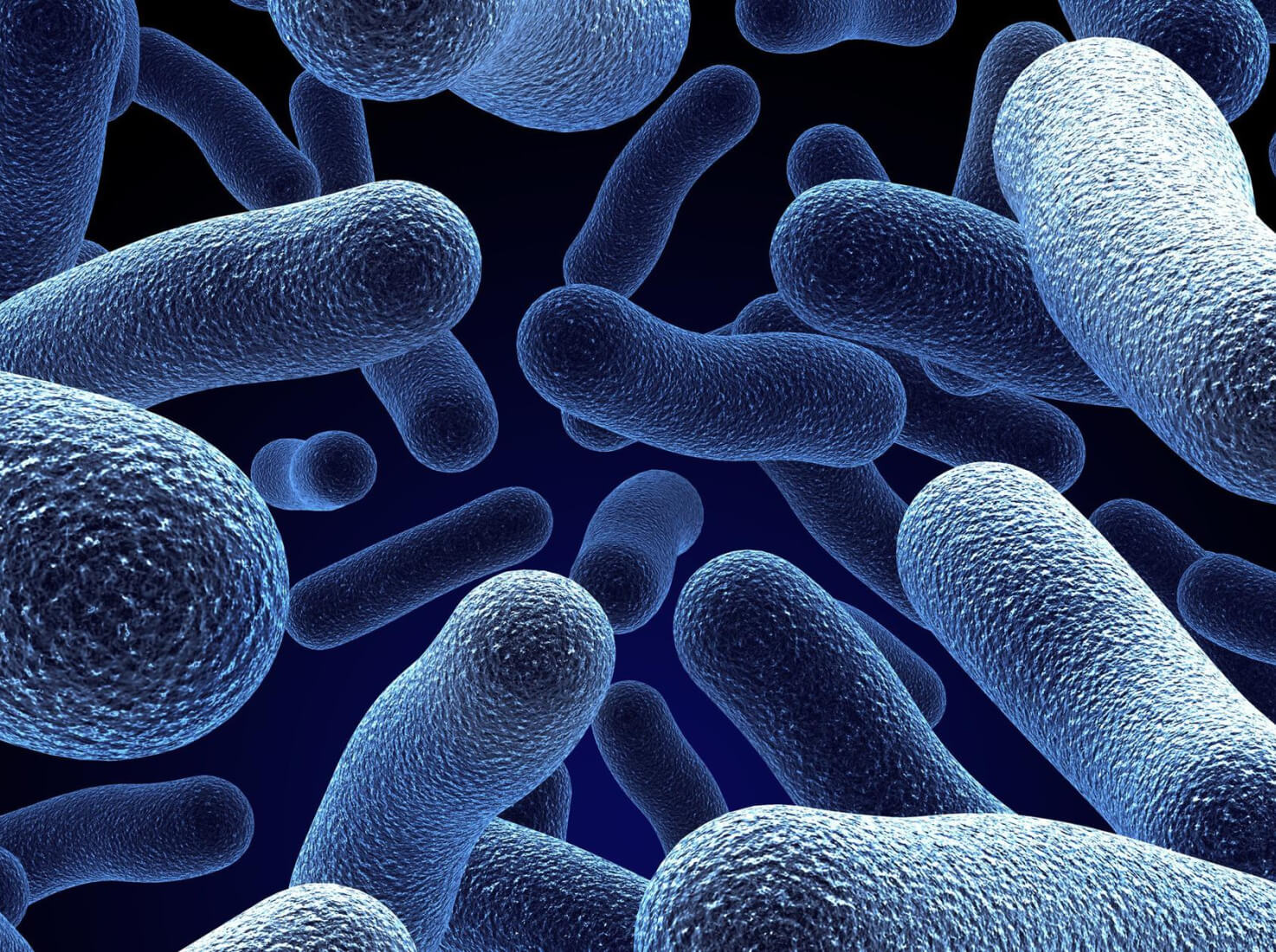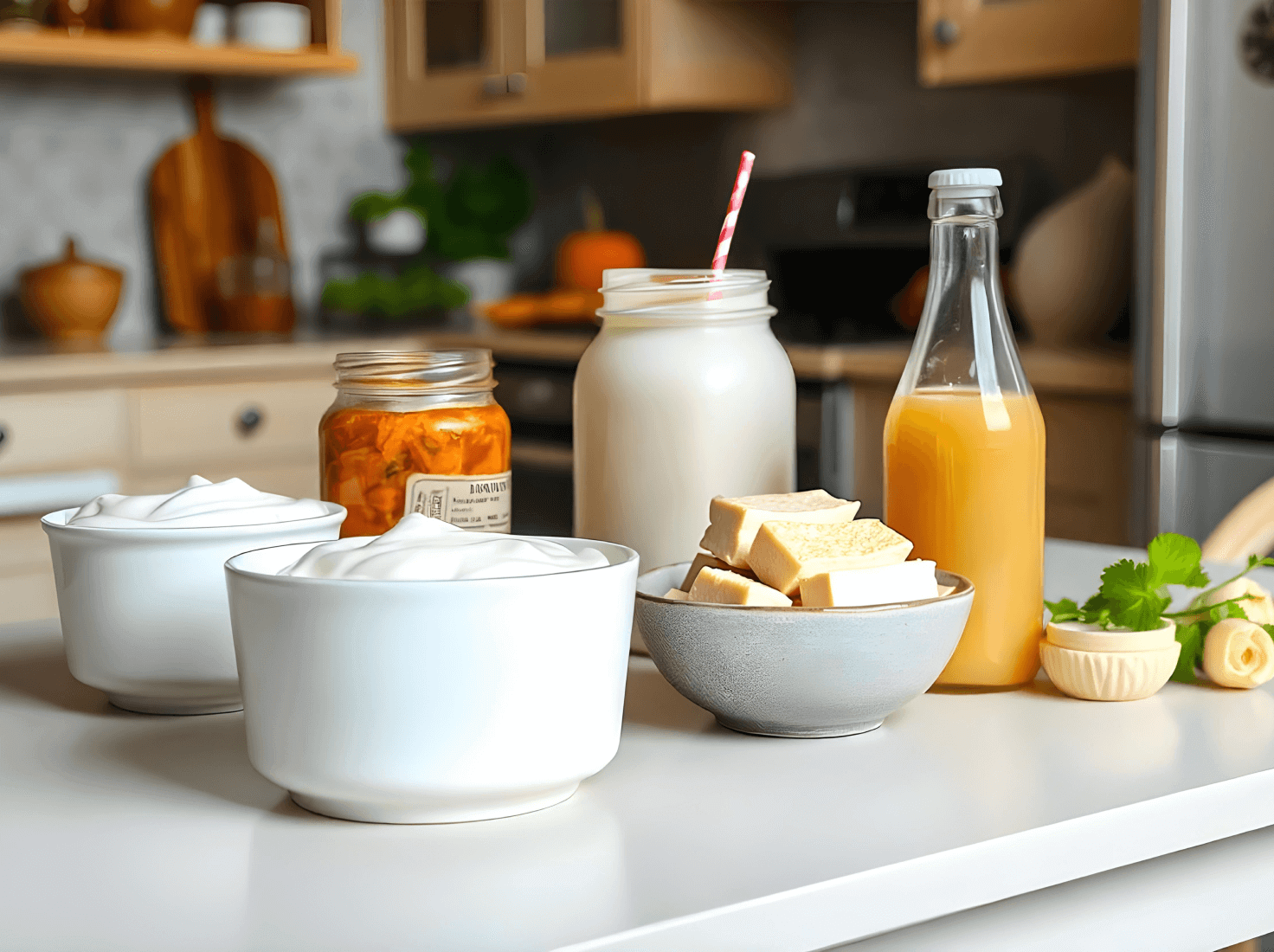
First consultation?

Need a refill?

First consultation?

Need a refill?
Prebiotics and Probiotics their importance, and foods to consume
Nutrition

Leah Bush
•
6 mins
• Dec 13, 2024
In recent years, the terms "prebiotics" and "probiotics" have become more common in health and wellness discussions. Both are integral to maintaining a healthy gut, which plays a central role in overall health. However, there is still some confusion around what these terms mean and how they impact our wellbeing. While prebiotics and probiotics are both related to gut health, they serve different functions.
This blog will explain the differences between prebiotics and probiotics, their importance to health, and which foods are beneficial to consume in order to maintain a healthy balance of gut microbiota.
What are Prebiotics and Probiotics?

Probiotics are live microorganisms that, when consumed in adequate amounts, provide health benefits to the host (that's you!). These beneficial bacteria can help restore balance to your gut microbiome, which may be disrupted by factors like illness, poor diet, or antibiotic use. Probiotics are often found in fermented foods and dietary supplements.¹
Prebiotics, on the other hand, are non-digestible food ingredients that promote the growth and activity of beneficial microorganisms in the gut. Think of prebiotics as food for the good bacteria that probiotics help populate. They help stimulate the growth of these beneficial bacteria, thus supporting a healthy digestive system.¹
Both prebiotics and probiotics are essential for maintaining a healthy gut ecosystem, but they function in different ways. Probiotics introduce beneficial bacteria into your digestive system, while prebiotics nourish and fuel these bacteria to help them thrive.
The Role of Prebiotics and Probiotics in Gut Health
The human gastrointestinal (GI) tract is home to trillions of microorganisms, including bacteria, viruses, fungi, and other microbes. This collection of microbes is collectively known as the microbiota. For optimal health, the microbiota should remain in balance, with beneficial bacteria outnumbering harmful pathogens.
Probiotics play a key role in achieving this balance by supporting the growth of beneficial bacteria. These microorganisms help protect the gut lining, aid in digestion, and prevent the overgrowth of harmful bacteria. Probiotics can also help reduce inflammation, enhance immune function, and contribute to the production of essential vitamins, such as vitamin K and B vitamins.
Prebiotics, by providing nourishment to beneficial bacteria, further enhance the effects of probiotics. By encouraging the growth of these healthy microorganisms, prebiotics help ensure the gut microbiota remains balanced and efficient at performing its protective, digestive, and immune-supporting functions.
When taken together, prebiotics and probiotics form a powerful duo that improves overall gut health, enhances digestion, supports immune function, and may even improve mood and mental health. This combination is often referred to as synbiotics, and it can have a profound effect on both digestive and overall health.¹
The Health Benefits of Prebiotics and Probiotics
Both prebiotics and probiotics have been shown to offer a range of health benefits, particularly when it comes to digestion, immunity, and disease prevention.¹
Improved Digestion: Probiotics help to break down food, produce beneficial compounds like short-chain fatty acids (SCFAs), and maintain a healthy gut lining. Prebiotics, by feeding the beneficial bacteria, support the probiotics in maintaining these essential digestive functions.
Stronger Immune System: About 70% of the immune system is located in the gut. By maintaining a healthy gut microbiome with the help of prebiotics and probiotics, we can strengthen the immune system, reduce inflammation, and improve our body's ability to fight off infections.
Enhanced Mental Health: The gut-brain axis is a complex communication system between the gut and the brain. A healthy microbiome has been linked to improved mood, cognitive function, and reduced symptoms of anxiety and depression. Prebiotics and probiotics may help reduce gut inflammation, which is often associated with mental health disorders.
Reduced Risk of Chronic Diseases: Research suggests that a healthy gut microbiota may reduce the risk of chronic diseases, such as obesity, diabetes, heart disease, and autoimmune conditions. Prebiotics and probiotics may play a role in maintaining this healthy microbiota, which can, in turn, reduce the risk of these conditions.

Foods to Consume for Prebiotics and Probiotics
A balanced diet rich in prebiotic and probiotic foods is essential for promoting gut health. Here are some key foods to include in your diet to support the beneficial bacteria in your gut:
Probiotic-Rich Foods:²
Yogurt – One of the most popular sources of probiotics, especially varieties that contain live and active cultures.
Kefir – A fermented milk drink that contains a diverse range of probiotic bacteria.
Kimchi – A spicy Korean dish made from fermented vegetables, typically cabbage and radishes, that contains beneficial bacteria.
Sauerkraut – Fermented cabbage that is rich in probiotics.
Miso – A fermented soybean paste used in Japanese cuisine, often in soups, that contains probiotics.
Pickles – Naturally fermented pickles, particularly those made in brine, can be a good source of probiotics.
Tempeh – A fermented soy product that is rich in probiotics and is a great plant-based protein option.
Prebiotic-Rich Foods:³
Garlic – Contains inulin, a type of prebiotic fiber that promotes the growth of beneficial bacteria.
Onions – Like garlic, onions contain inulin and other prebiotic fibers that help feed the beneficial bacteria in the gut.
Leeks – A relative of garlic and onions, leeks are another great source of prebiotics.
Bananas – Contain resistant starch, which has prebiotic effects and supports gut health.
Asparagus – High in inulin, asparagus helps promote the growth of healthy gut bacteria.
Chicory Root – One of the richest sources of inulin, chicory root is often used as a prebiotic supplement.
Oats – Contain beta-glucan, which acts as a prebiotic fiber to feed beneficial gut bacteria.
Apples – Apples contain pectin, a type of fiber that supports gut health and the growth of beneficial microbes.
How to Incorporate Prebiotics and Probiotics into Your Diet
Incorporating prebiotics and probiotics into your daily diet is easier than you might think. Here are some tips for boosting your gut health:
Start your day with probiotic yogurt or kefir – Add fresh fruit and oats for added prebiotics.
Include fermented foods – Add kimchi, sauerkraut, miso, or pickles to your meals.
Cook with garlic and onions – Both ingredients are not only delicious but also great for feeding your gut bacteria.
Snack on bananas or apples – These fruits provide beneficial prebiotics.
Add prebiotic vegetables – Incorporate asparagus, leeks, and artichokes into salads, soups, or stir-fries.
A combination of these foods can help support the growth and activity of beneficial bacteria in the gut, improving digestion, immune function, and overall health.
Conclusion
The balance of bacteria in the gut plays a critical role in our overall health. By incorporating prebiotics and probiotics into your diet, you can help maintain this balance and promote good digestive and immune health. Remember, a healthy gut is not just about taking supplements; it's about creating a nourishing environment through the foods you consume. Whether you choose probiotic-rich fermented foods or prebiotic-rich fibers, both play an essential role in keeping your microbiota in check and your body functioning at its best.
Sources :
What are pre and pro biotics, Mechanism of action, benefits - You, S., Ma, Y., Yan, B., Pei, W., Wu, Q., Ding, C., & Huang, C. (2022). The promotion mechanism of prebiotics for probiotics: A review. Frontiers in Nutrition, 9. https://doi.org/10.3389/fnut.2022.1000517
Probiotic rich foods - Office of Dietary Supplements - Probiotics. (n.d.). https://ods.od.nih.gov/factsheets/Probiotics-HealthProfessional/
prebiotic rich foods - Davani-Davari, D., Negahdaripour, M., Karimzadeh, I., Seifan, M., Mohkam, M., Masoumi, S., Berenjian, A., & Ghasemi, Y. (2019). Prebiotics: definition, types, sources, mechanisms, and clinical applications. Foods, 8(3), 92. https://doi.org/10.3390/foods8030092
Current version
Dec 13, 2024
Written by
Leah Bush (Acute Care Nurse Practitioner)
Lose weight effectively
with GLP-1s
Fill out a quick form to share your
medical history, helping us tailor the
perfect plan for you.

Similar Health Guides
Lose weight effectively
with GLP-1s
Fill out a quick form to share your
medical history, helping us tailor the
perfect plan for you.

Lose weight effectively
with GLP-1s
Fill out a quick form to share your
medical history, helping us tailor the
perfect plan for you.

Get meds delivered from
the comfort of your home.
Download our app now, and get amazing rewards!


Prebiotics and Probiotics their importance, and foods to consume
Nutrition

Leah Bush
•
6 mins
• Dec 13, 2024
In recent years, the terms "prebiotics" and "probiotics" have become more common in health and wellness discussions. Both are integral to maintaining a healthy gut, which plays a central role in overall health. However, there is still some confusion around what these terms mean and how they impact our wellbeing. While prebiotics and probiotics are both related to gut health, they serve different functions.
This blog will explain the differences between prebiotics and probiotics, their importance to health, and which foods are beneficial to consume in order to maintain a healthy balance of gut microbiota.
What are Prebiotics and Probiotics?

Probiotics are live microorganisms that, when consumed in adequate amounts, provide health benefits to the host (that's you!). These beneficial bacteria can help restore balance to your gut microbiome, which may be disrupted by factors like illness, poor diet, or antibiotic use. Probiotics are often found in fermented foods and dietary supplements.¹
Prebiotics, on the other hand, are non-digestible food ingredients that promote the growth and activity of beneficial microorganisms in the gut. Think of prebiotics as food for the good bacteria that probiotics help populate. They help stimulate the growth of these beneficial bacteria, thus supporting a healthy digestive system.¹
Both prebiotics and probiotics are essential for maintaining a healthy gut ecosystem, but they function in different ways. Probiotics introduce beneficial bacteria into your digestive system, while prebiotics nourish and fuel these bacteria to help them thrive.
The Role of Prebiotics and Probiotics in Gut Health
The human gastrointestinal (GI) tract is home to trillions of microorganisms, including bacteria, viruses, fungi, and other microbes. This collection of microbes is collectively known as the microbiota. For optimal health, the microbiota should remain in balance, with beneficial bacteria outnumbering harmful pathogens.
Probiotics play a key role in achieving this balance by supporting the growth of beneficial bacteria. These microorganisms help protect the gut lining, aid in digestion, and prevent the overgrowth of harmful bacteria. Probiotics can also help reduce inflammation, enhance immune function, and contribute to the production of essential vitamins, such as vitamin K and B vitamins.
Prebiotics, by providing nourishment to beneficial bacteria, further enhance the effects of probiotics. By encouraging the growth of these healthy microorganisms, prebiotics help ensure the gut microbiota remains balanced and efficient at performing its protective, digestive, and immune-supporting functions.
When taken together, prebiotics and probiotics form a powerful duo that improves overall gut health, enhances digestion, supports immune function, and may even improve mood and mental health. This combination is often referred to as synbiotics, and it can have a profound effect on both digestive and overall health.¹
The Health Benefits of Prebiotics and Probiotics
Both prebiotics and probiotics have been shown to offer a range of health benefits, particularly when it comes to digestion, immunity, and disease prevention.¹
Improved Digestion: Probiotics help to break down food, produce beneficial compounds like short-chain fatty acids (SCFAs), and maintain a healthy gut lining. Prebiotics, by feeding the beneficial bacteria, support the probiotics in maintaining these essential digestive functions.
Stronger Immune System: About 70% of the immune system is located in the gut. By maintaining a healthy gut microbiome with the help of prebiotics and probiotics, we can strengthen the immune system, reduce inflammation, and improve our body's ability to fight off infections.
Enhanced Mental Health: The gut-brain axis is a complex communication system between the gut and the brain. A healthy microbiome has been linked to improved mood, cognitive function, and reduced symptoms of anxiety and depression. Prebiotics and probiotics may help reduce gut inflammation, which is often associated with mental health disorders.
Reduced Risk of Chronic Diseases: Research suggests that a healthy gut microbiota may reduce the risk of chronic diseases, such as obesity, diabetes, heart disease, and autoimmune conditions. Prebiotics and probiotics may play a role in maintaining this healthy microbiota, which can, in turn, reduce the risk of these conditions.

Foods to Consume for Prebiotics and Probiotics
A balanced diet rich in prebiotic and probiotic foods is essential for promoting gut health. Here are some key foods to include in your diet to support the beneficial bacteria in your gut:
Probiotic-Rich Foods:²
Yogurt – One of the most popular sources of probiotics, especially varieties that contain live and active cultures.
Kefir – A fermented milk drink that contains a diverse range of probiotic bacteria.
Kimchi – A spicy Korean dish made from fermented vegetables, typically cabbage and radishes, that contains beneficial bacteria.
Sauerkraut – Fermented cabbage that is rich in probiotics.
Miso – A fermented soybean paste used in Japanese cuisine, often in soups, that contains probiotics.
Pickles – Naturally fermented pickles, particularly those made in brine, can be a good source of probiotics.
Tempeh – A fermented soy product that is rich in probiotics and is a great plant-based protein option.
Prebiotic-Rich Foods:³
Garlic – Contains inulin, a type of prebiotic fiber that promotes the growth of beneficial bacteria.
Onions – Like garlic, onions contain inulin and other prebiotic fibers that help feed the beneficial bacteria in the gut.
Leeks – A relative of garlic and onions, leeks are another great source of prebiotics.
Bananas – Contain resistant starch, which has prebiotic effects and supports gut health.
Asparagus – High in inulin, asparagus helps promote the growth of healthy gut bacteria.
Chicory Root – One of the richest sources of inulin, chicory root is often used as a prebiotic supplement.
Oats – Contain beta-glucan, which acts as a prebiotic fiber to feed beneficial gut bacteria.
Apples – Apples contain pectin, a type of fiber that supports gut health and the growth of beneficial microbes.
How to Incorporate Prebiotics and Probiotics into Your Diet
Incorporating prebiotics and probiotics into your daily diet is easier than you might think. Here are some tips for boosting your gut health:
Start your day with probiotic yogurt or kefir – Add fresh fruit and oats for added prebiotics.
Include fermented foods – Add kimchi, sauerkraut, miso, or pickles to your meals.
Cook with garlic and onions – Both ingredients are not only delicious but also great for feeding your gut bacteria.
Snack on bananas or apples – These fruits provide beneficial prebiotics.
Add prebiotic vegetables – Incorporate asparagus, leeks, and artichokes into salads, soups, or stir-fries.
A combination of these foods can help support the growth and activity of beneficial bacteria in the gut, improving digestion, immune function, and overall health.
Conclusion
The balance of bacteria in the gut plays a critical role in our overall health. By incorporating prebiotics and probiotics into your diet, you can help maintain this balance and promote good digestive and immune health. Remember, a healthy gut is not just about taking supplements; it's about creating a nourishing environment through the foods you consume. Whether you choose probiotic-rich fermented foods or prebiotic-rich fibers, both play an essential role in keeping your microbiota in check and your body functioning at its best.
Current version
Dec 13, 2024
Written by
Leah Bush (Acute Care Nurse Practitioner)
Fact checked by
Dr. Jonathan Hinds (MD, FACEP, Certified Physician)
Sources :
What are pre and pro biotics, Mechanism of action, benefits - You, S., Ma, Y., Yan, B., Pei, W., Wu, Q., Ding, C., & Huang, C. (2022). The promotion mechanism of prebiotics for probiotics: A review. Frontiers in Nutrition, 9. https://doi.org/10.3389/fnut.2022.1000517
Probiotic rich foods - Office of Dietary Supplements - Probiotics. (n.d.). https://ods.od.nih.gov/factsheets/Probiotics-HealthProfessional/
prebiotic rich foods - Davani-Davari, D., Negahdaripour, M., Karimzadeh, I., Seifan, M., Mohkam, M., Masoumi, S., Berenjian, A., & Ghasemi, Y. (2019). Prebiotics: definition, types, sources, mechanisms, and clinical applications. Foods, 8(3), 92. https://doi.org/10.3390/foods8030092



